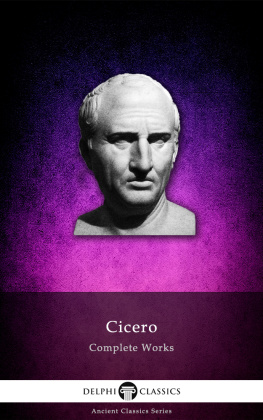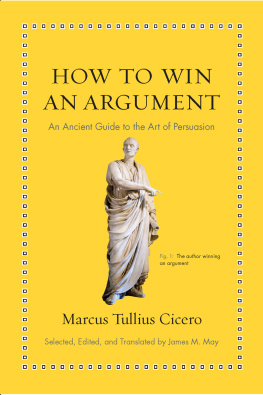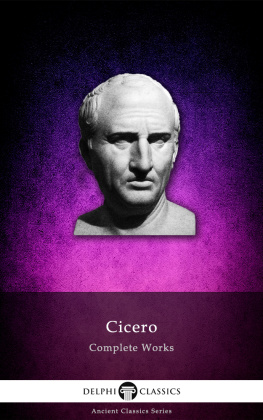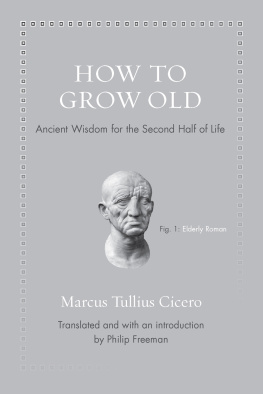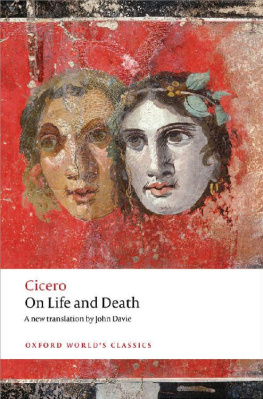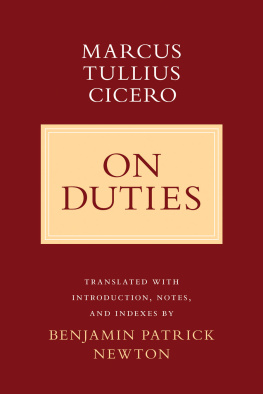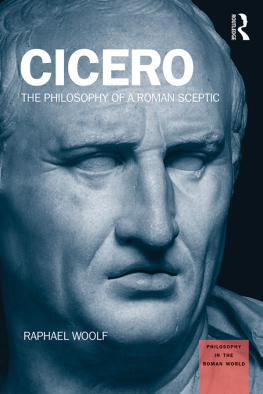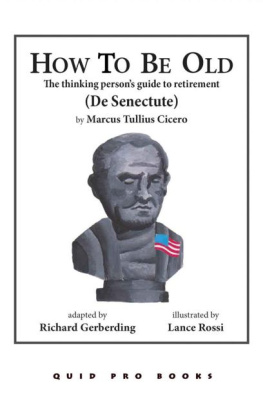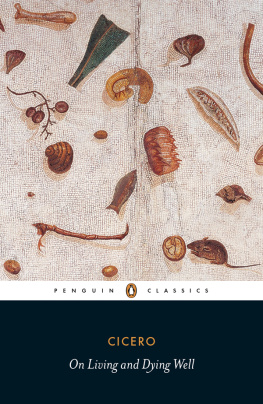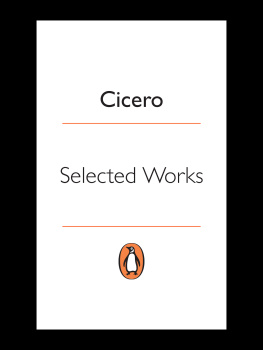CAMBRIDGE TEXTS IN THE HISTORY OF PHILOSOPHY

CICERO
On Moral Ends
CAMBRIDGE TEXTS IN THE HISTORY OF PHILOSOPHY
Series editors
KARL AMERIKS
Professor of Philosophy at the University of Notre Dame
DESMOND M. CLARKE
Professor of Philosophy at University College Cork
The main objective of Cambridge Texts in the History of Philosophy is to expand the range, variety and quality of texts in the history of philosophy which are available in English. The series includes texts by familiar names (such as Descartes and Kant) and also by less well-known authors. Wherever possible, texts are published in complete and unabridged form, and translations are specially commissioned for the series. Each volume contains a critical introduction together with a guide to further reading and any necessary glossaries and textual apparatus. The volumes are designed for student use at undergraduate and postgraduate level and will be of interest not only to students of philosophy, but also to a wider audience of readers in the history of science, the history of theology and the history of ideas.
For a list of titles published in the series, please see end of book.
CICERO

On Moral Ends
EDITED BY
JULIA ANNAS
University of Arizona
TRANSLATED BY
RAPHAEL WOOLF
Harvard University

CAMBRIDGE UNIVERSITY PRESS
Cambridge, New York, Melbourne, Madrid, Cape Town, Singapore, So Paulo, Delhi, Mexico City
Cambridge University Press
The Edinburgh Building, Cambridge CB2 8RU, UK
Published in the United States of America by Cambridge University Press, New York
www.cambridge.org
Information on this title: www.cambridge.org/9780521660617
Cambridge University Press 2001
This publication is in copyright. Subject to statutory exception and to the provisions of relevant collective licensing agreements, no reproduction of any part may take place without the written permission of Cambridge University Press.
First published 2001
9th printing 2012
Printed and bound in the United States of America by Edwards Brothers
A catalogue record for this publication is available from the British Library
ISBN 978-0-521-66061-7 hardback
ISBN 978-0-521-66901-6 paperback
Cambridge University Press has no responsibility for the persistence or accuracy of URLs for external or third-party Internet websites referred to in this publication, and does not guarantee that any content on such websites is, or will remain, accurate or appropriate. Information regarding prices timetables and other factual information given in this work are correct at the time of first printing but Cambridge University Press does not guarantee the accuracy of such information thereafter.
Contents
Preface
For helpful comments on the Introduction and notes I am very grateful to Desmond Clarke, Hilary Gaskin, Raphael Woolf, Daniel Russell and Alison Futrell. I am especially grateful to Alison Futrell, my colleague in Roman History, for help with a number of Roman issues, from the Voconian law to the excess, in this work, of members of the Licinius Crassus family called Marcus. I also owe thanks to all the students, graduate and undergraduate, to whom I have taught this work in my courses on ancient ethics, and who have helped me come to see the difficulties it presents for a modern reader. I am grateful for the work of scholars who have, in the last decades, produced new translations of important texts from the Hellenistic or post-Aristotelian period of ancient philosophy, and have helped in the process of making the theories of the Stoics, Epicureans and even eclectics like Antiochus part of the normal syllabus in ancient philosophy. I hope that this new translation and edition will make Ciceros text more accessible to a wide audience interested in ancient ethics.
It has been a pleasure to work with Raphael Woolf, who has produced a translation which is not only philosophically accurate but also stylish in Ciceros manner without expanding the English to twice the length of the Latin. In writing the Introduction and notes I have also been helped by older editions and translations, particularly the older edition of Madvig, and the translations and comments in the Bud and Loeb editions. I have aimed to introduce the work to readers who need some help with the Greco-Roman cultural background that Cicero takes for granted, and who also need, fully to appreciate the arguments, some orientation as to the philosophical background to the debates which Cicero develops. Since the audience for this book will be diverse people interested in some or all of philosophy, ethics, history, the classical world and the history of ideas the help I have provided will inevitably be too much for some and too little for others. I hope, however, that it will at least help many people to begin their own engagement with Ciceros debates. Cicero thinks through the arguments that he sets out in order to help the reader, and himself, find the right answer to the major issue in ethics: how we should live. It is an issue that still deserves our attention today.
JULIA ANNAS
Introduction
In June 45On Moral Ends is the most theoretical of the works on moral philosophy, accompanied by more specialized discussions in On Duties and Tusculan Disputations and the more applied Friendship, Old Age and Reputation.
On Moral Ends is a substantial work of moral philosophy. There have been periods when it has been an influential part of the discourse of moral theory, and it has always been a valuable source for the three moral theories it discusses, those of Epicurus, the Stoics and Antiochus (the last a hybrid influenced by Aristotle). The modern reader, however, will probably find some aspects of the work puzzling, and an introduction to it is usefully framed round answering three questions which are likely to occur to us.
(1) Why is a work on moral theory in dialogue form, specifically in three dialogues, in each of which a theory is first put forward and then attacked?
(2) Why does a work on moral theory focus on our ends or goals (the title De Finibus is often translated final ends) rather than, say, right action or duty?
(3) Why these theories? And, given that Cicero aims to cover the most important theories, where are Plato and Aristotle?
The sceptical method of ethics
Modern books do not typically introduce you to ethics by arguing for and then against theories. Cicero, however, aims to introduce his readers not just to the content of three ethical theories but to thinking about them philosophically, and for him this involves arguing for and against them. This is because he writes as an Academic Sceptic a sceptic, that is, from Platos Academy.
Plato pointedly refrains from presenting philosophical ideas in the form of treatises which give doctrines to be absorbed by the reader; he writes dialogues, in which ideas are discussed rather than presented on authority. The major figure in his dialogues, Socrates, sometimes puts forward positive claims of his own, and sometimes argues against the positions of others; when he does the latter, the arguments are always ad hominem not in the modern sense of attacking the person rather than the position, but in the sense of using only premises accepted by the interlocutor, and showing him that his position has problems which are internal to it, and do not depend on accepting any of Socrates own claims. Socrates arguments against the positions of others reveal how far they are from having adequate rational support for their claims, and how ill-advised they are to hold them confidently. The positive ideas that Plato gives to Socrates and others are put forward as ideas which should themselves be subject to the same kind of probing; in the
Next page

